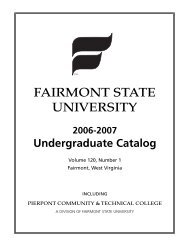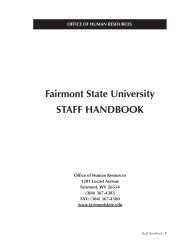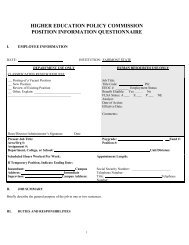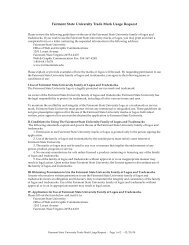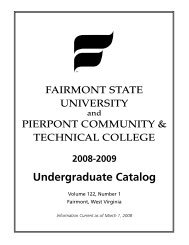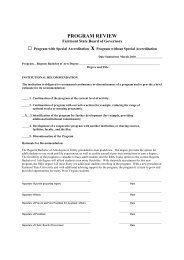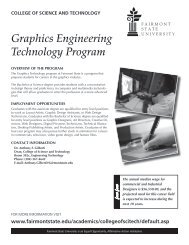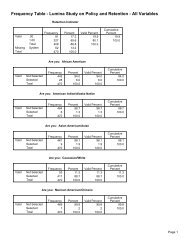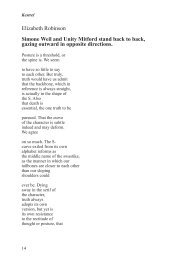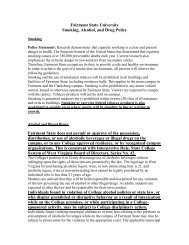Faculty Handbook - Fairmont State University
Faculty Handbook - Fairmont State University
Faculty Handbook - Fairmont State University
You also want an ePaper? Increase the reach of your titles
YUMPU automatically turns print PDFs into web optimized ePapers that Google loves.
122<br />
For more information or to file a complaint call:<br />
304-367-4386<br />
Director of Affirmative Action<br />
Room 324, Hardway Hall<br />
<strong>Fairmont</strong> <strong>State</strong> <strong>University</strong><br />
<strong>Fairmont</strong>, WV 26554<br />
II.<br />
III.<br />
IV.<br />
Definition of Racial Harassment<br />
For the purposes of <strong>Fairmont</strong> <strong>State</strong> <strong>University</strong> policy, the term racial harassment is<br />
defined as any verbal, written, or physical conduct directed toward an individual or<br />
group of individuals on the basis of race, national origin, color, ethnicity, or association<br />
with persons of a different race, which a person knows or reasonably should have<br />
known would intimidate, demean, or degrade the individual's or group's character, selfworth<br />
or dignity.<br />
Racial harassment is further defined as that conduct which, when based upon race,<br />
national origin, color, ethnicity, or association with persons of a different race, has the<br />
effect of limiting or denying equal opportunity or treatment and is conducted in<br />
disregard for that individual's or group's human or civil rights and which may result in<br />
their mental, emotional, or physical discomfort, ridicule or harm. Offensive language or<br />
behavior which interferes with a person's employment, educational status or<br />
performance or otherwise creates a hostile environment shall fall within the meaning of<br />
racial harassment.<br />
Threats or other forms of intimidation or retaliation against complaining witnesses,<br />
other witnesses, any reviewing officer, or any review panel shall constitute a separate<br />
violation of this policy, which may be subject to direct administrative or judicial action.<br />
Educational Efforts Related to Racial Harassment<br />
The Harassment Policy and the <strong>State</strong>ment on Racial Harassment will not by themselves<br />
accomplish elimination of racial harassment. Policy efforts must be coupled with<br />
proactive educational efforts throughout the <strong>Fairmont</strong> <strong>State</strong> <strong>University</strong> community. The<br />
Office of Multicultural Affairs works to achieve racial and multicultural harmony<br />
through the development of educational programs, policies and procedures designed to<br />
encourage independence, maturity and an appreciation for racial and cultural diversity.<br />
Other campus entities which are also expected to provide such educational efforts<br />
include the <strong>Faculty</strong> Development Committee, the Staff Development Committee, Student<br />
Government, and each supervisor of staff, faculty, or student workers.<br />
Complaint Procedures, Available Sanctions, & Appeals<br />
Complaint procedures, which include options for consultation, informal resolution<br />
mechanisms, and formal resolution mechanisms for students, faculty, classified staff,<br />
and administrators, are outlined in the Harassment Policy, as are examples of<br />
harassment situations. The Harassment Policy also describes available sanctions, the<br />
appeal process, confidentiality measures, and mechanisms for providing statistical<br />
summaries of reported incidents. See also <strong>Fairmont</strong> <strong>State</strong> <strong>University</strong> Harassment Policy,<br />
Sections V-VIII.



